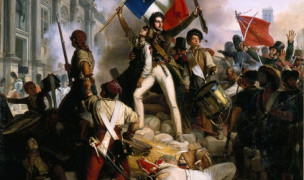 5 Terms
5 TermsHome > Terms > English (EN) > folklore
folklore
The term “folklore” has somewhat different connotations in popular and professional usages. Most Americans generally understand folklore to refer to traditional narratives, beliefs or practices, often transmitted orally, which have no basis in truth, and “the folk” themselves are believed to be non or preliterate; yet this is not the case. This notion has its roots in the antiquarian scholarship of the eighteenth and nineteenth century influenced by theories of Romantic or cultural nationalism, where conceptions of “the folk” were equated with European peasant cultures, which scholars believed held the distinctive “folk souls” of each nation. Early American folklore research concentrated on marginalized groups within American society. Thus, “folklore” was the preserve of African Americans, recent immigrant groups and Southern Appalachians, who were at that time perceived as the earliest “white indigenous” American peoples. Early American folklorists collected tales, beliefs and songs, often looking for “survivals” from the parent African or European culture. Later, with the rise of trade-union activism in the 1920s and 1930s, “the folk” expanded to include the working classes. “Folk music” was then not confined to Euro-originated ballads and African American musics, but also became more widely applicable to workers’ music and, later, other protest music. Folk art was similarly a genre of preservation of memories (although it later became a hot commodity in more sophisticated urban galleries and auctions as well).
In the 1960s, the field of folklore in the United States shifted dramatically in terms of theory and subject matter. Richard Dorson was one of the first scholars to champion folklore as a modern academic discipline distinct from either literary studies or anthropology, with comparative ethnographic and archival methodologies at its heart.
Folklorists then began to lessen the emphasis on survivals and to explore wider aspects of behavior, communication and the relationship of folklore and tradition to society within a more pluralistic paradigm. The result of this was not only an expansion of the subject matter that folklorists researched, but also a new conceptualization of that “the folk” actually were. Rather than only representing the more marginalized groups within a society, the folk became essentially any subgroup who demonstrated stylized, distinctive cultural forms, ranging from the family to the workplace. Thus, everyone is actually a member of a variety of folk groups. American folklorists also began researching urban cultures and exploring the role of technology and mass media on traditions and tradition formation. As a result, categories such as “Xerox lore” and “urban legend” have become fruitful areas of study. In the twentieth century American folklorists engaged with a very wide range of material. Although “folklore” may imply to some an emphasis on narrative or belief, the field comprises a number of different artistic genres, including dance, food, speech narrative, festival, music, art, ritual, medicine and religion. Folklorists also research occupational and business culture, tourism and all aspects of popular culture.
A new emphasis on multiculturalism and the shift of the model of American cultures from “melting-pot” to “mosaic” has resulted in an increased public interest in folklore in the 1990s. Since the 1930s when the federally funded Workers Education Administration hired folklorists to collect traditions from various cultural groups in the United States, there has been a close association between folklore, folklorists and public bodies. Many states have folklore commissions that hire folklorists to identify distinctive communities and individual artists, and then help to educate the public about their work. Folklorists often work with museums, festival organizers and, increasingly with tourism officials to promote and raise awareness of various cultural traditions. Perhaps the most well-known example of public folklore display in the United States is the annual Smithsonian Festival of American Folklife, which each year showcases various traditions and practices of a particular state. In addition to publicsector and arts organizations, some folklorists also work in the private sector, assisting in inter-office communications and diversity training.
- Part of Speech: noun
- Synonym(s):
- Blossary:
- Industry/Domain: Culture
- Category: American culture
- Company: Routledge
- Product:
- Acronym-Abbreviation:
Other Languages:
Member comments
Terms in the News
Billy Morgan
Sports; Snowboarding
The British snowboarder Billy Morgan has landed the sport’s first ever 1800 quadruple cork. The rider, who represented Great Britain in the 2014 Winter Olympics in Sochi, was in Livigno, Italy, when he achieved the man-oeuvre. It involves flipping four times, while body also spins with five complete rotations on a sideways or downward-facing axis. The trick ...
Marzieh Afkham
Broadcasting & receiving; News
Marzieh Afkham, who is the country’s first foreign ministry spokeswoman, will head a mission in east Asia, the state news agency reported. It is not clear to which country she will be posted as her appointment has yet to be announced officially. Afkham will only be the second female ambassador Iran has had. Under the last shah’s rule, Mehrangiz Dolatshahi, a ...
Weekly Packet
Language; Online services; Slang; Internet
Weekly Packet or "Paquete Semanal" as it is known in Cuba is a term used by Cubans to describe the information that is gathered from the internet outside of Cuba and saved onto hard drives to be transported into Cuba itself. Weekly Packets are then sold to Cuban's without internet access, allowing them to obtain information just days - and sometimes hours - after it ...
Asian Infrastructure Investment Bank (AIIB)
Banking; Investment banking
The Asian Infrastructure Investment Bank (AIIB) is an international financial institution established to address the need in Asia for infrastructure development. According to the Asian Development Bank, Asia needs $800 billion each year for roads, ports, power plants or other infrastructure projects before 2020. Originally proposed by China in 2013, a signing ...
Spartan
Online services; Internet
Spartan is the codename given to the new Microsoft Windows 10 browser that will replace Microsoft Windows Internet Explorer. The new browser will be built from the ground up and disregard any code from the IE platform. It has a new rendering engine that is built to be compatible with how the web is written today. The name Spartan is named after the ...
Featured Terms
bishop's ring
A bishop's ring is a diffuse brown or bluish halo observed around the sun. It is typically observed after large volcanic eruptions. Most ...
Contributor
Featured blossaries
anton.chausovskyy
0
Terms
25
Blossaries
4
Followers
Heroes of the French Revolution
 5 Terms
5 Terms
Silentchapel
0
Terms
95
Blossaries
10
Followers
Apple Mergers and Acquisitions
 20 Terms
20 Terms
Browers Terms By Category
- Manufactured fibers(1805)
- Fabric(212)
- Sewing(201)
- Fibers & stitching(53)
Textiles(2271) Terms
- General astronomy(781)
- Astronaut(371)
- Planetary science(355)
- Moon(121)
- Comets(101)
- Mars(69)
Astronomy(1901) Terms
- Algorithms & data structures(1125)
- Cryptography(11)
Computer science(1136) Terms
- General architecture(562)
- Bridges(147)
- Castles(114)
- Landscape design(94)
- Architecture contemporaine(73)
- Skyscrapers(32)
Architecture(1050) Terms
- Cooking(3691)
- Fish, poultry, & meat(288)
- Spices(36)


